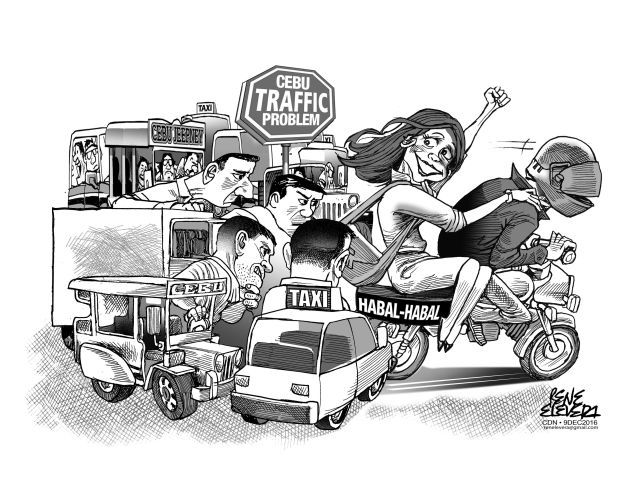
Lest habal-habal (motorcycle-for-hire) operators rejoice prematurely, last Wednesday’s hearing at the Cebu City Council is only a step in the very long journey towards regulating their operations in the city.
Not a few city councilors were supportive of the habal-habal drivers whose presence and operations have benefited city residents headed to upland barangays whose roads are largely undeveloped and thus inaccessible to jeepneys or other forms of public transport.
It’s how they operate in the metropolis that is the bigger concern for traffic agencies and the public in general. Even if they are considered illegal by the Land Transportation and Franchising Board (LTFRB), habal-habal drivers are patronized by commuters for their ability to weave through the sea of jeepneys, buses and privately owned vehicles trapped in traffic congestion.
In Cebu City, they are particularly useful whenever there is a heavy downpour, as taxis become reluctant and choosy in picking their passengers who aren’t headed for flood-prone areas while jeepneys are easily filled up to overcapacity, yet its drivers still insist on inserting one more passenger for extra income.
But they have yet to gain recognition and legitimacy from the LTFRB. Regional LTFRB Director Ahmed Cuizon said they only supervise four-wheel vehicles, not two- or three-wheel
ones like habal-habal and tricycles.
While a proposed Cebu City ordinance legalizing habal-habal operations is being reviewed, it is imperative that the national government’s transport agencies, the LTFRB, Land Transportation Office (LTO) and the Department of Transportation (DOTr) should at the least be informed about its continued existence and value to the commuters.
At the same time, there are organized habal-habal groups that should put in the effort not only to discipline their ranks but to lobby for and win public support for their operations.
They can do this by helping spell out and suggest clear-cut guidelines to regulate their operations in order to avoid aggravating traffic and to fetch people to their destinations safely, which includes requiring their passengers to wear helmets at all times.
We understand that these habal-habal operators can be tapped as a voting bloc by calculating politicians in the same way that the trisikad (pedicab) drivers of Talisay City managed to mobilize themselves and swing crucial voting support to former mayor Johnny “JVR” delos Reyes over then congressman Eddie Gullas in the 2013 elections.
A thorough study should be made by the Cebu City Transportation Office to draw up areas where they can operate without disrupting traffic and where their services are most needed and their fare rates, etc.
The ordinance is still a long way towards approval, but there is little doubt that they won’t be going away anytime soon.